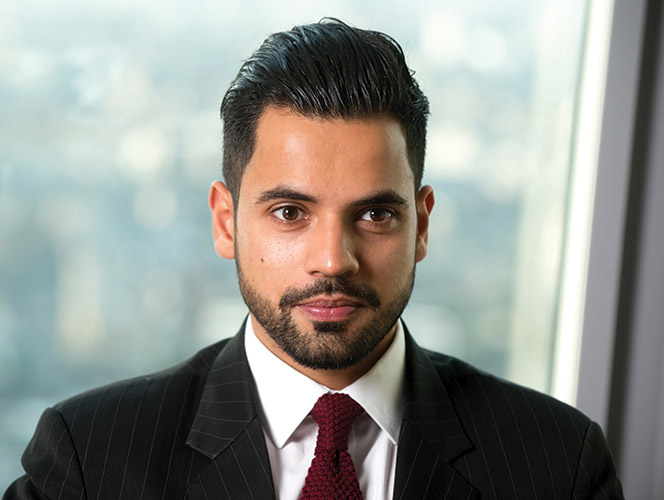A former barrister at both DAC Beachcroft and DWF, where he led the advocacy unit, Sahar Farooqi now has more than 40,000 followers on Linkedin, an audience which has afforded him numerous networking opportunities online
Why did you decide to use social media as a tool and what is it about social media, and LinkedIn specifically, that you’ve found useful?
I think if I go back far enough to when I was self-employed in chambers, nobody really used social media and something like LinkedIn was seen as kind of useless for counsel as a marketing tool as work came through instructing solicitors or clerks. I actually started to think about it more seriously several years later after I left self-employment and went in-house at DWF, where my role was to build a reputation for what would ultimately become their in-house chambers. I used this service called Yammer, which is similar to LinkedIn but exclusively within an organisation, so there’s nothing external facing to it, it’s all internal. I found, as I wrote on Yammer about what we were doing in our business in the UK, I was getting responses from all over the firm, and I was able to use it to great effect for internal instructions. Eventually, I figured that if this exists, there’s probably a similar platform in the wider world that I can also use, and that was LinkedIn.
I think when you graduate from a microcosm to a much bigger platform, what you thought would work doesn’t necessarily work with a global audience and you’re engaging with people with different mentalities. You have to sense check where you might get trolled as no-one’s going to do that for you on an internal basis. So it took me a little while to get to grips with what LinkedIn is about and build a profile.
At the same time, I also wanted to use it to support students. I’ve always had an interest in the development of the Bar and access to the Bar, so I was looking at ways I could help with that and, after a year or two, I began to realise that what resonates with people was just being honest, not just pitching up and saying ‘I’m delighted to announce I’ve been promoted’ and then not say anything for another 18 months. The more I talked about things that I have actually experienced, the more people reached out to me, and the conversations developed from there.
People also ask me why I don’t use Twitter or why I don’t use Instagram. Bluntly, first, I don’t understand those platforms as well, and second, I think the degree of trolling and attacks that go on on some of those other platforms are not really the kinds of things I want to entertain. On LinkedIn, people are not anonymous.
With that in mind, have you had any negative experiences on social media?
Yeah, you do have negative experiences – trolling is consistent across any platform. There are people that are just looking to create problems. Sometimes, I think you have to accept that if you put anything on the internet, regardless of the platform, you’re putting it out there in perpetuity. People can then take it and put it on a platform you’re not on, which has happened to me before and has resulted in online attacks about my children and things like that, which is completely bizarre.
Alongside using it for your career, have you also found it beneficial to talk about diversity, mental health and other similar topics?
Yeah, absolutely. With greater exposure and greater confidence, you have more latitude to talk about some of those things. Fundamentally, you don’t want your experience to be the end of the conversation, it needs to be the start of the conversation. When people recognise that what you have experienced is the same as them, it creates its own inertia and its own traction, and opportunities arise, whether it’s direct instructions or opportunities to work with students. It’s also given me the opportunity to do some good and create resources like Pupillage, which has consolidated resources for aspiring barristers looking for pupillage; and bring attention to causes, such as Aya Hachem’s murder or floods in Pakistan.
As a recruitment tool, it’s also been incredibly powerful. I think probably about 85% of the recruitment I’ve done across two firms in the last decade has been through LinkedIn, because people see your posts and what you’re saying and can use months of content to trust you and see whether they would also want to work there.
From your experience, would you recommend it to other legal professionals as something they should use?
It’s hard to answer that question because I think that’s a bit like asking someone if they are willing to go to a networking event. Each individual is going to answer differently. Some people would just never want to do that, and other people are desperate to do that, and there’s all sorts in between. That’s the analogy that I use, that it’s ultimately like a sustained networking event. I think, if used in a moderate way (which is not how I would describe how I use it), it’s probably something you can find a gentle utility and satisfaction in, but it’s not for everyone.
Return to our social media influencers feature ‘Social circles’.














